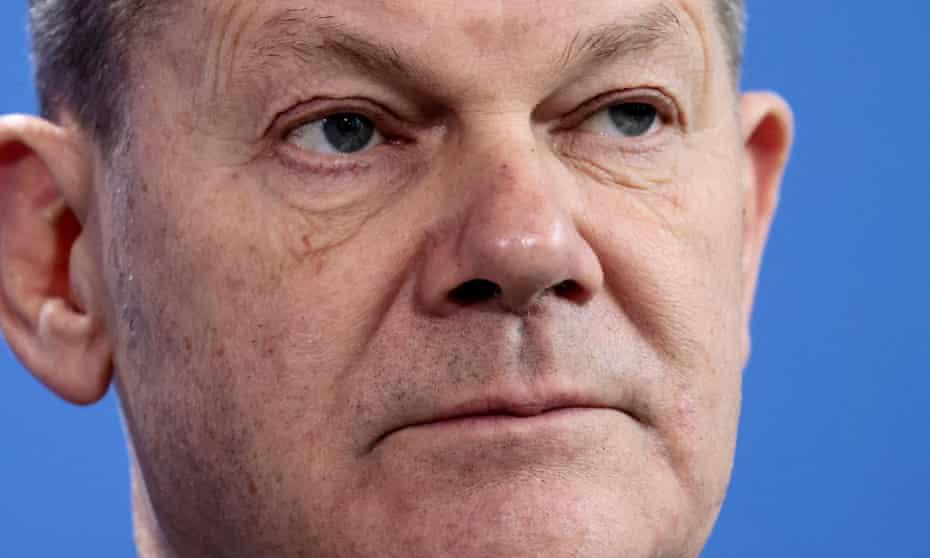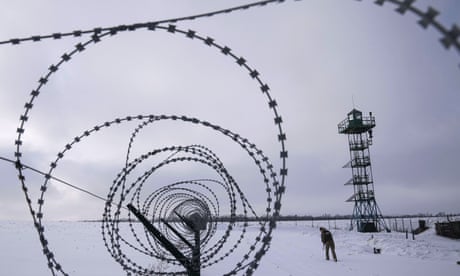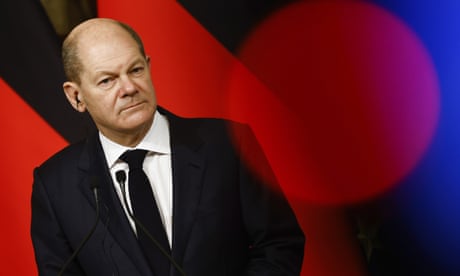‘Almost invisible’: Germans lose patience with Olaf Scholz as he hesitates on Ukraine
The new chancellor has faced criticism abroad for his stance, and is now coming under fire at home


Germany’s new chancellor Olaf Scholz is waving goodbye to the honeymoon period of his tenure, as his “inaudible” stance over the brewing crisis on the Ukrainian border is failing to impress not just Russia-hawks abroad but also more ambivalent voters at home.
Scholz, whose liberal-left “traffic light” coalition was sworn in less than two months ago, has been criticised by Kyiv and other east-central European capitals for sticking to his country’s restrictive stance on weapons export to crisis regions and looking slow to spell out the potential sanctions that could be triggered by a Russian invasion into Ukraine.
This week, Scholz has also had to face similar criticism in Berlin, however. “How does it feel when allies are classifying Germany’s attitude as unreliable?”, the Social Democrat politician was asked in an interview on German television on Wednesday night.

When Scholz denied this was the case, the host interrupted him, pointing out that even his ambassador in Washington had warned in a leaked memo that “Germany, we have a problem”.
While Angela Merkel rarely excelled as an orator or rhetorician, Scholz “seems to want to surpass her in the art of disappearance”, wrote weekly Der Spiegel, describing her successor’s performance over the last few weeks as “almost invisible, inaudible”.
A survey by pollster Infratest Dimap published on Thursday saw support for Scholz’s SPD drop to 22%, overtaken by the conservative Christian Democratic Union (CDU) on 27%. His personal approval rating dropped by 17 percentage points in the same poll.
One factor that has undermined the chancellor’s authority in particular is the behaviour of his last centre-left predecessor in the chancellory – and former boss – Gerhard Schröder, who continues to comment on global affairs in his role as chair of Russian energy companies Nord Stream and Rosneft.
In his television interview, Scholz was urged to clarify that he was not taking the ex-chancellor turned lobbyist’s advice. “If I understand the constitution of the federal German republic correctly, there is only one chancellor and that is me,” Scholz said with characteristic understatement.
Yet another factor that may explain the German leader’s paralysis is that he is catering towards often contradictory views on Russia held by the German public.
The US is traditionally identified by Germans as their most important partner – a November 2021 survey by the Körber Foundation found a resurgent faith in transatlantic relations after the election of US president Joe Biden. Less than 5% of those surveyed believed Russia to be an important partner.
But as a whole the German public does not perceive Vladimir Putin’s Russia to be a direct threat either. The same poll, carried out before the buildup of Russian troops on the Ukrainian border last December, has only 16% of Germans surveyed identifying Russia as a threat to German values. More than 80% said the country was a minor threat or no threat at all.
On the conflict on the Ukrainian border, German doveishness is not merely a party-political compromise: Infratest Dimap’s poll of the public saw a clear majority in favour of granting Russian security assurances from Nato and even a slim majority against economic sanctions.
Restricting arms exports into crisis regions on principle is not only backed by every party in the Bundestag – from the far-right Alternative für Deutschland to leftwing Die Linke – but also a 71% majority of the electorate.
Such tendencies are even more pronounced among older generations and those living in the eastern regions of the country. A survey by pollster Forsa published this week found 43% of those living in the former states of socialist East Germany hold the US responsible for intensifying the conflict in eastern Ukraine, while only 32% blamed Russia. In western Germany, 52% held Russia responsible, and only 17% said the problem lay with the US.

Holding such differing views in balance is a particular problem for Scholz and his party: the SPD currently governs in all five states of the former east, whose premiers wield influence via the Bundesrat, the upper house of the German parliament.
One of these states, Mecklenburg-Vorpommern, where the SPD scored a clean sweep of direct mandates at last year’s election, is also where the Nord Stream 2 pipeline arrives from Russia. The completed-but-unapproved infrastructure project, criticised by most of Europe for making Germany reliant on Russian gas, is highly popular among the local population and supported by Social Democrat politicians in the region.
Scholz’s disappearing act is not going to satisfy these voters, however, said Liana Fix, a Russia expert for the Körber Foundation and resident fellow at the German Marshall Fund.
“Again and again, what we found when we surveyed the German public on attitudes to Russia is that independence matters: people don’t like the feeling they’re being talked into something,” Fix told the Guardian.
“German voters may not want their country to supply weapons, but they want their leader to be visible in the diplomatic effort. And that is something that should be within Scholz’s reach.”
The new chancellor has faced criticism abroad for his stance, and is now coming under fire at home
German chancellor Scholz at a news conference in January
German chancellor Scholz at a recent news conference. He has been criticised for his stance on Ukraine. Photograph: Hannibal Hanschke/Reuters
Philip Oltermann
Germany’s new chancellor Olaf Scholz is waving goodbye to the honeymoon period of his tenure, as his “inaudible” stance over the brewing crisis on the Ukrainian border is failing to impress not just Russia-hawks abroad but also more ambivalent voters at home.
Scholz, whose liberal-left “traffic light” coalition was sworn in less than two months ago, has been criticised by Kyiv and other east-central European capitals for sticking to his country’s restrictive stance on weapons export to crisis regions and looking slow to spell out the potential sanctions that could be triggered by a Russian invasion into Ukraine.
This week, Scholz has also had to face similar criticism in Berlin, however. “How does it feel when allies are classifying Germany’s attitude as unreliable?”, the Social Democrat politician was asked in an interview on German television on Wednesday night.
A Ukrainian border guard patrols the border with Russia near Hoptivka village, Kharkiv region.
France, Germany and Turkey reach out to Putin as troops remain on Ukraine border Read more
When Scholz denied this was the case, the host interrupted him, pointing out that even his ambassador in Washington had warned in a leaked memo that “Germany, we have a problem”.
While Angela Merkel rarely excelled as an orator or rhetorician, Scholz “seems to want to surpass her in the art of disappearance”, wrote weekly Der Spiegel, describing her successor’s performance over the last few weeks as “almost invisible, inaudible”.
A survey by pollster Infratest Dimap published on Thursday saw support for Scholz’s SPD drop to 22%, overtaken by the conservative Christian Democratic Union (CDU) on 27%. His personal approval rating dropped by 17 percentage points in the same poll.
One factor that has undermined the chancellor’s authority in particular is the behaviour of his last centre-left predecessor in the chancellory – and former boss – Gerhard Schröder, who continues to comment on global affairs in his role as chair of Russian energy companies Nord Stream and Rosneft.
In his television interview, Scholz was urged to clarify that he was not taking the ex-chancellor turned lobbyist’s advice. “If I understand the constitution of the federal German republic correctly, there is only one chancellor and that is me,” Scholz said with characteristic understatement.
Yet another factor that may explain the German leader’s paralysis is that he is catering towards often contradictory views on Russia held by the German public.
The US is traditionally identified by Germans as their most important partner – a November 2021 survey by the Körber Foundation found a resurgent faith in transatlantic relations after the election of US president Joe Biden. Less than 5% of those surveyed believed Russia to be an important partner.
But as a whole the German public does not perceive Vladimir Putin’s Russia to be a direct threat either. The same poll, carried out before the buildup of Russian troops on the Ukrainian border last December, has only 16% of Germans surveyed identifying Russia as a threat to German values. More than 80% said the country was a minor threat or no threat at all.
On the conflict on the Ukrainian border, German doveishness is not merely a party-political compromise: Infratest Dimap’s poll of the public saw a clear majority in favour of granting Russian security assurances from Nato and even a slim majority against economic sanctions.
Restricting arms exports into crisis regions on principle is not only backed by every party in the Bundestag – from the far-right Alternative für Deutschland to leftwing Die Linke – but also a 71% majority of the electorate.
Such tendencies are even more pronounced among older generations and those living in the eastern regions of the country. A survey by pollster Forsa published this week found 43% of those living in the former states of socialist East Germany hold the US responsible for intensifying the conflict in eastern Ukraine, while only 32% blamed Russia. In western Germany, 52% held Russia responsible, and only 17% said the problem lay with the US.
Germany's Chancellor Olaf Scholz
Ghosts of Germany’s past rise as Olaf Scholz seeks strategy for Ukraine Read more
Holding such differing views in balance is a particular problem for Scholz and his party: the SPD currently governs in all five states of the former east, whose premiers wield influence via the Bundesrat, the upper house of the German parliament.
One of these states, Mecklenburg-Vorpommern, where the SPD scored a clean sweep of direct mandates at last year’s election, is also where the Nord Stream 2 pipeline arrives from Russia. The completed-but-unapproved infrastructure project, criticised by most of Europe for making Germany reliant on Russian gas, is highly popular among the local population and supported by Social Democrat politicians in the region.
Scholz’s disappearing act is not going to satisfy these voters, however, said Liana Fix, a Russia expert for the Körber Foundation and resident fellow at the German Marshall Fund.
“Again and again, what we found when we surveyed the German public on attitudes to Russia is that independence matters: people don’t like the feeling they’re being talked into something,” Fix told the Guardian.
“German voters may not want their country to supply weapons, but they want their leader to be visible in the diplomatic effort. And that is something that should be within Scholz’s reach.”
No comments:
Post a Comment